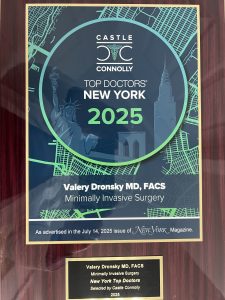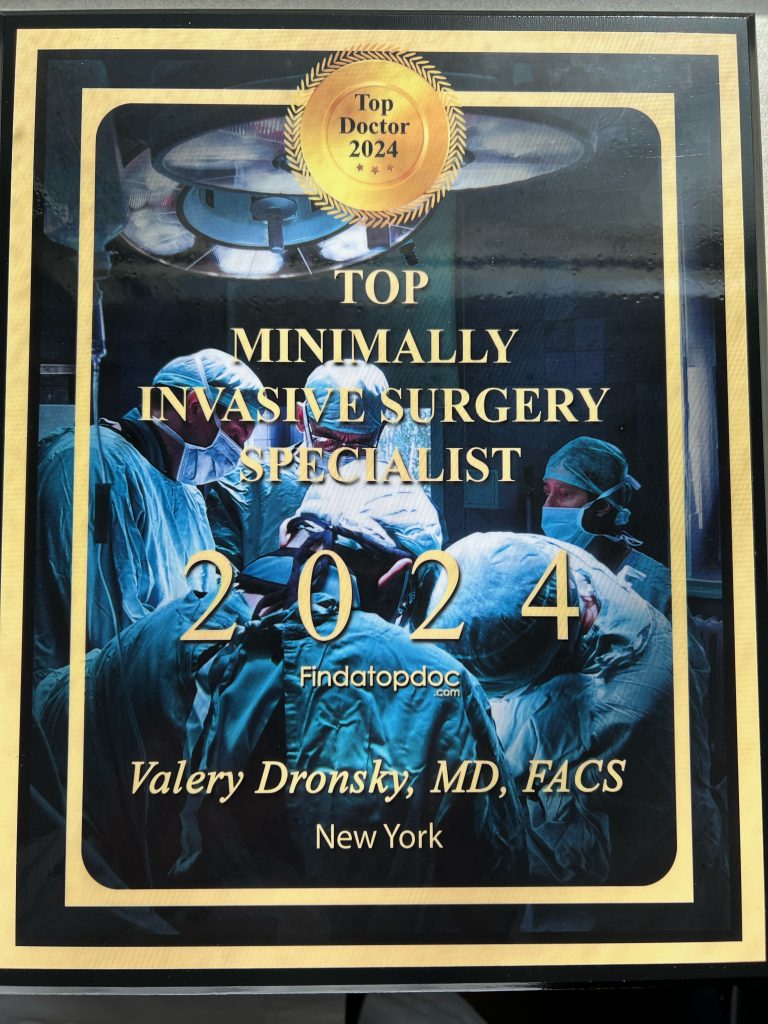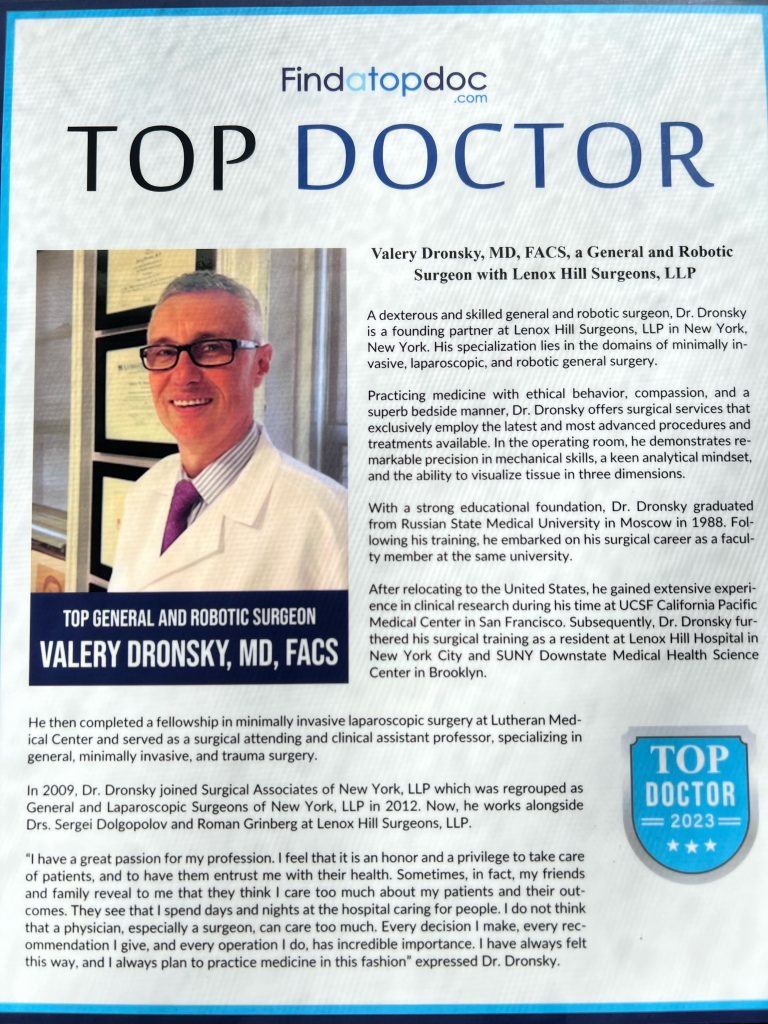CALL TODAY 646-846-1136 | EMAIL
Surgical Experts Dedicated to Improving Lives
At Lenox Hill Minimally Invasive Surgery PLLC, Dr. Valery Dronsky and his staff of medical professionals provide compassionate care with the highest ethical & professional standards. In our state of the art facility, we offer surgical services using only the most cutting edge and current procedures and treatments. We specialize in general surgery, including extensive experience in performing hernia repair surgery. Our expertise is in minimally invasive surgery and robotic surgery. Minimally invasive and robotic surgery often allow patients to experience easier recovery than traditional open surgery. They also allow for more precise and less traumatic surgery. When robotic and minimally invasive surgery is not an option, we are also skilled and experienced in traditional open surgical procedures.
Dr. Dronsky is an experienced and highly skilled surgeon having undergone extensive training in school, residency and fellowships. He practices medicine with ethical behavior, compassion and superb bedside manner. In the operating room he exhibits precision mechanical abilities, analytical thinking and the ability to visualize tissue in three dimensions. These innate and learned skills allow Dr. Dronsky to be one of the most dexterous and skilled professionals in New York City and the Country.
Call us: 646-846-1136
PATIENT TESTIMONIALS
Recent Awards
We are honored and deeply appreciative to have consistently received prestigious awards and recognition year after year, establishing us as one of New York’s foremost hospitals for a wide range of general surgeries, safety measures, specialized procedures, and overall excellence in healthcare. At Lenox Hill Minimally Invasive Surgery, our unwavering commitment lies in delivering exceptional care and unwavering support to our patients, guaranteeing their safety and successful recovery throughout their entire surgical experience.
Hospital Quality Awards
 America’s 50 Best Hospitals Award™ (2023, 2022)
America’s 50 Best Hospitals Award™ (2023, 2022)
Top 1% in the nation for providing the highest clinical quality year over year.

America’s 100 Best Hospitals Award™ (2021)
Top 2% in the nation for consistently delivering clinical quality year over year.

America’s 250 Best Hospitals Award™ (2023, 2022, 2021)
Top 5% in the nation for consistently delivering clinical quality.

Patient Safety Excellence Award™ (2023, 2022)
Top in the nation for providing excellence in patient safety by preventing infections, medical errors, and other preventable complications.
Specialty Clinical Quality Awards

America’s 100 Best Hospitals for Cardiac Care Award™ (2023, 2022, 2021, 2020, 2019)
Superior clinical outcomes in heart bypass surgery, coronary interventional procedures, heart attack treatment, heart failure treatment, and heart valve surgery.

America’s 100 Best Hospitals for Coronary Intervention Award™ (2023, 2022, 2021, 2020, 2019)
Superior clinical outcomes in coronary intervention procedures (angioplasty with stent).

America’s 100 Best Hospitals for Prostate Surgery Award™ (2023, 2022, 2021)
Superior clinical outcomes in prostate removal surgery and transurethral resection of the prostate.
Click to see all of our Healthgrades best doctors awards





Visit our main website at www.LenoxHillMinimallyInvasiveSurgery.com
Blog Posts are Below:
Monthly Archives: February 2020
What is a Diagnostic Laparoscopy?
Diagnostic laparoscopy is used to identify the internal organs of the pelvis to detect any diseases or disorders. Diagnostic laparoscopy is a minimally invasive and quick procedure that requires only a few small incisions to examine the internal organs. For examination, the doctors uses a laparoscope in this process. Laparoscope is an innovative tool with a camera that a doctor inserts into the body through the small incisions. It connects to a high-resolution monitor on which the surgeon can see the inside of an abdomen.
When do you need a Diagnostic Laparoscopy?
You will need to have a diagnostic laparoscopy for any of the several conditions that may indicate some disease or disorder in the lower abdominal or pelvic area.
Abdominal Pain
If you experience acute or chronic abdominal pain, you might need a laparoscopy diagnosis to identify the cause of the pain. The causes can include:
- Appendicitis
- Pelvic infections
- Adhesive scar tissues
- Endometriosis
- Bowel Syndrome
- Abdominal Bleeding
- Cancer
- Fluid accumulation in abdomen
- Infection or problem with digestive organs like the stomach, intestine or pancreas
Lump in Abdominal
You may feel a mass or lump inside your abdominal area that might be painful or painless. When you experience abdominal pain, your doctor will conduct an examination to feel the lumps, which you cannot see or feel. In both cases, your doctor will ask you to get a diagnostic laparoscopy. Your surgeon might even collect some tissues from the abdominal mass for biopsy. If there are any lumps, this could be an indication of the presence of tumor in some cases.
Examination of Reproductive Organs
One of the main reasons for getting a diagnostic laparoscopy is the examination of reproductive organs. Both men and women may need to get laparoscopy for the following reasons:
- Bleeding
- Severe pain during urination, menstruation or ejaculation
- Decreased fertility – not getting successfully pregnant
- Any unusual and discomforting symptoms in the pelvic area or reproductive organs
Process of Laparoscopic Diagnosis
First the surgeon will give you sedatives to relax. Also, an anesthesia expert will give you general anesthesia before the surgery. You will get a breathing tube in your throat and a catheter in your urinary bladder for draining the urine. Your surgeon will use a special instrument to make a small incision below your naval.
Through the hole, they will release a gas to inflate the pelvic area for examination. After that, your surgeon will insert the laparoscope, which would help view the inside of your abdomen. Your surgeon might make further incisions to move the organs out of way for better view. After that, the surgeon will collect fluid or scar tissues for biopsy.
Your surgeon will allow the carbon dioxide gas to move out of your body. They will remove the catheter and make the necessary stitches. The whole process would take only 30-60 minutes. You will get a discharge within a few hours after the surgery.
What to do before and after Diagnostic Laparoscopy
Before getting diagnostic laparoscopy, you should tell your doctor if you are on any medications or had any surgery before. You must tell your doctor about your recent medical condition. Your doctor might change your medication that can interfere with the process or give you new ones to prepare your body for the surgery. You must tell your doctor if you think you are going to get pregnant.
The recovery after diagnostic laparoscopy is quick but it can vary from person to person, depending upon how their body reacts to the surgery. You need to do the following after the surgery:
- Take maximum rest and get enough sleep
- Don’t engage in heavy or tiring physical activities
- Do light exercises or stretches to avoid chances of blood clot
- Wear clothes that have loose fitting
Do you feel abdominal pain or experience any of the symptoms mentioned above? If yes, then contact us or book an appointment for a consultation. We have the best surgeons for diagnostic laparoscopy in NYC. Call us at 212-988-1136 or visit our website for more information.
What Are The Benefits Of Minimally Invasive Surgery?
There was a time when the word “surgery” used to scare people, and they would try their best to evade a surgical procedure. The hesitance is understandable as the idea of a large cut on your body is discomforting in many ways. However, thanks to the evolution in medical science, surgical techniques have improved tremendously.
Now, surgical procedures, either big or small, are done within a few minutes to a few hours. The best part about the minimally invasive surgeries is the painless procedure with fast recovery. The advanced techniques are helping with quality treatments to patients who have to undergo surgical procedures.
What Is Minimally Invasive Surgery?
Unlike the traditional open surgeries that would require a large incision, a surgeon makes multiple tiny incisions of less than an inch. For the process, the surgeon uses
- Small surgical instruments, such as a clamp or knife, for incisions
- A laparoscope, i.e., a tiny tube with a miniature camera at one end.
Once the surgeon marks the incisions, he/she then passes the mini camera through one of the cuts. The doctor monitors the images captured by the camera on the screen and uses them as a reference. These images give the surgeon a clear picture of the area undergoing surgery.
The doctor may also insert specialized surgical instruments, such as a balloon or flexible stent, through the incisions if required. After the surgery, the surgeon stitches the incisions and sometimes places a mesh for additional support.
Common Minimally Invasive Procedures
Minimally invasive surgeries have become the first choice of patients for multiple medical conditions. In fact, it would not be wrong to say that these surgeries are now the standard surgical procedures for many routine operations.
Your doctor may recommend a minimally invasive surgery for:
- Appendectomy –the removal of the appendix
- Hernia repair
- Cholecystectomy –the removal of the gallbladder
- Abdominal examination
- Colon resection
- Gynecological surgeries
Depending upon the location of the surgery, you may call a minimally invasive technique an endoscopic surgery, a keyhole surgery, thoracoscopic surgery, or laparoscopy.
Benefits of the Minimally Invasive Surgery
Compared to the traditional open surgery, minimally invasive surgery has several benefits to offer. Not only is the procedure quick and less painful, but also ensures rapid recovery. Let’s have a look at some of the advantages.
Small Incisions/Cuts
One of the biggest advantages of the minimally invasive surgeries is the smaller incisions. The surgeon marks a few tiny incisions, big enough to insert a tube, laparoscope, or other small surgical instruments.
Accurate Procedures
The minimally invasive surgeries are more accurate than the open surgeries because of the laparoscope that gives a clear picture of the internal structures.
Less Painful Procedure
It is proven that minimally invasive surgeries are less painful in comparison to open surgeries. The advanced technique does not cause discomfort or any damage to the healthy tissues. Also, there is reduced blood loss in invasive surgeries.
Minimal Scars
Since the size of the incisions is smaller in the minimally invasive techniques, you may have very small or unnoticeable scar with a few stitches only.
Rapid Recovery
The minimal procedures allow the patient to heal sooner and resume the normal routine. Since the surgeries take a few hours to complete, the patient may leave for home the same day or the next day. A short hospital stay means reduced medical bill.
Final Thoughts
Minimally Invasive surgeries are the standard surgical techniques widely in practice today. Whether you have a minor issue or want a surgical intervention for a major health condition, it is the best option. At Lenox Hill Minimally Invasive Surgery, we have compassionate, dedicated, and highly professional surgeons who are expert in minimally invasive surgeries. Contact us today and book an appointment with the most skilled surgeons in NYC.















